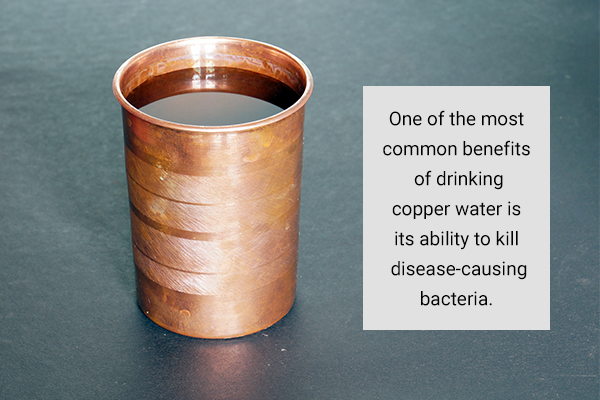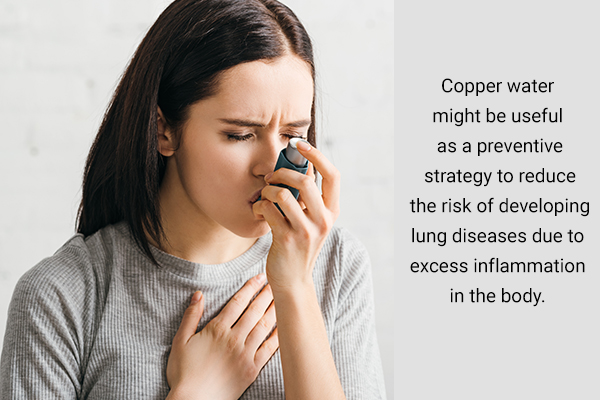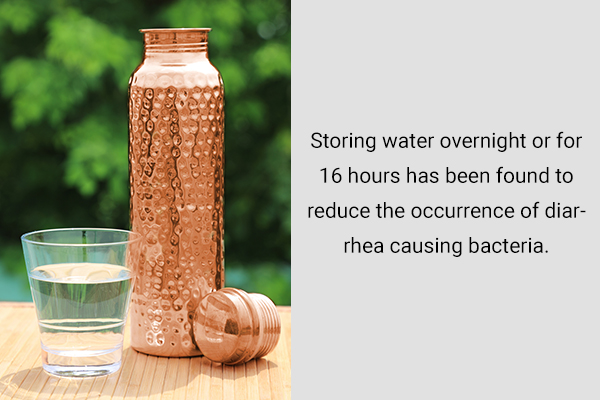In this article:
In traditional Indian practices, water was often stored in clay pots or metal containers (often copper) to be used for drinking and cooking. It was said that storing water in such a manner has a cooling effect and the water becomes free of impurities and was better for your health.

With the modernization of the world, such practices were lost to time and people started using stainless-steel, glass, and plastic containers for storing and drinking water.
However, a recent shift in health trends has seen people turning to copper water or copper-charged water for its various health benefits.
What Is Copper Water?
When distilled water is stored in large copper vessels including pots and jugs, some of the copper leaches from the vessel into the drinking water, creating copper-charged water. (1)
The amount of copper usually falls within the recommended limits of intake by healthy individuals and is considered safe to drink. (1)
Benefits of Copper-Charged Water
Copper is an important mineral involved in many functions of the human body. It controls and impacts the function of several organs and is required in amounts of 1.5–3 mg each day according to the Food and Nutrition Board. (2)
Drinking copper water can boost copper intake and can support some body functions.
1. Kills bacteria

One of the most common benefits of drinking copper water is its ability to kill disease-causing bacteria. For people living in low socioeconomic zones, this can be a good practice to make drinking water safe.
Studies have found water stored in copper vessels for 16 hours to be low in bacteria that cause diarrhea and other digestive issues. (1)
The amount of copper that leaches into the water is considered well within the safe limits as determined by the Word Health Organization (WHO). (1)
2. Supports cardiovascular health
Copper is an essential trace mineral that supports heart health. It is involved in the cellular functions of the heart.
A deficiency of copper increases the risk of ischemic heart disease, where energy supply to the heart is decreased due to the narrowing of arteries. The deficiency can also increase the amount of bad cholesterol, which can block arteries and lead to severe heart issues including heart attacks. (4)
It is likely that copper-charged water can be beneficial for heart health by combating copper deficiency.
3. Aids lung function

Our body produces a protein called TNF-α, which increases inflammation in the body. It is specifically associated with lung disorders such as asthma, emphysema (shortness of breath), fibrosis, and chronic obstructive pulmonary disease (COPD).
In a study to evaluate the effectiveness of micronutrients in managing lung diseases, copper was found to reduce the inflammation that causes lung disease. (5)
Copper water might be useful as a preventative strategy to reduce the risk of developing lung diseases due to excess inflammation in the body.
4. Improves thyroid function
Some trace minerals such as copper are necessary for the proper functioning of the thyroid gland. The thyroid gland produces hormones that maintain metabolism and the growth of cells.
In a study of people with hypothyroidism, the presence of copper and adequate copper-selenium ratio may improve TSH levels and thyroid function. (6)
Copper-charged water can be used to improve TSH function if you have an underactive thyroid or hypothyroidism since it provides copper well within safe limits.
5. May aid digestion

Dietary copper can improve digestive ability and increase the functioning of intestinal cells, increasing the absorption of nutrients from the food you eat. (7)
Animal studies have found copper-rich feeds to reduce the frequency of diarrhea and improve some colonies of gut microorganisms including Lactobacilli and Enterobacteriaceae, which can improve overall digestion. (8)
Copper-charged water is likely to have a similar effect on the digestive system.
6. Improves brain function
Like in many other human organs, copper is also essential in the brain’s functioning. A deficiency of copper can cause brain disorders such as Menkes disease, Wilson’s disease, and Alzheimer’s disease. (9)
Since copper water can contribute to the dietary intake of copper, it can improve brain function and protect against certain neurodegenerative diseases.
7. Improves immunity
Similar to zinc and selenium, copper is also involved in improving the body’s immune response. In one study, copper-deficient rats were found to have enlarged spleens and lower T-cells, which also led to an increase in inflammation. (10)
Copper-charged water can be beneficial in providing sufficient dietary intake to improve the immune responses of the body.
8. Improves skin health

Recently, copper is being added to cosmetic products to improve the appearance of skin and boost skin health. It has antibacterial properties, reduces the appearance of fine lines and wrinkles, and increases the firmness and elasticity of the skin. (11)
It is also used to treat infections of the skin such as an athlete’s foot and to improve wound healing. (11)
Copper water can be used similarly as a toner, in face masks, or as a cleanser.
Precautions to Consider
Since copper is a trace metal, it can very easily be consumed in excess. Experts warn against the harmful effects of copper toxicity, which can include (12)
- Headache
- Stomach pain
- Severe thirst
- Diarrhea
- Irregular heartbeat
- Nausea and vomiting
- Fever
- Mood disorders, depression, and irritability
- Fatigue and difficulty in focusing
If you are consuming copper water daily, keep a check on your serum copper levels to prevent the occurrence of copper toxicity. In addition, remember to never cook acidic foods in copper vessels or add acidic ingredients (such as orange juice, lemon juice, and vinegar) to drinking water stored in copper jugs. (12)
Most-Asked Questions About Copper Water
How long do I store water in copper vessels?

Storing water overnight or for 16 hours was found to reduce the occurrence of diarrhea-causing bacteria.
Who should avoid copper water?
People who experience symptoms such as vomiting, diarrhea, and stomach pain should avoid drinking copper water. Those with Wilson’s disease and infants should also avoid it.
Can I drink copper water every day?
To avoid the risk of copper overdose and toxicity, limit your copper water intake to 2–3 cups each day.
Can I boil copper water and drink it?
Boiling water is a strategy to kill microorganisms. Since copper is effective in killing disease-causing microorganisms, there is no need to boil water that has been stored in copper vessels.
Does copper water helps in preventing anemia?
Copper as a mineral is involved in the production of red blood cells. Therefore, copper deficiency can manifest as anemia, which is resolved with oral copper supplementation.
Copper water may help prevent copper deficiency anemia, though the copper levels in copper water are below the daily requirement levels. (13)
Final Word
Copper water or copper-charged water obtained from storing drinking water in a copper vessel or copper jug overnight is gaining popularity due to its many health claims. It is effective in killing disease-causing bacteria, especially those that cause diarrhea and stomach issues.
Copper is an essential trace mineral involved in the proper functioning of many organs such as the lungs, brain, digestive organs, and even the skin.
Copper-charged water often contains copper in recommended amounts and generally is safe to consume. However, it is a good idea to keep a check on copper levels in the body to prevent copper toxicity from occurring.
- Was this article helpful?
- YES, THANKS!NOT REALLY


